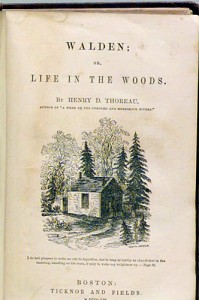Okay. Admittedly I’ve read parts of this book, but never read it cover to cover. But, since we were going to Boston, and then Walden Pond for our next trip, I decided that I really needed to finish this book. So, I started a few months ago, and finished on the airplane ride into Boston. Not that the book was long, but because I hadn’t had much time to sit down and read over the past few months.
With that being said, Henry David Thoreau was part of the Transcendentalism movement. The ideas came as a movement against the current state and structure of the age’s society and spiritual state. As Wikipedia would say, transcendentalism is “the belief in an ideal spirituality that ‘transcends’ the physical and empirical and is realized only through the individual’s intuition, rather than through the doctrines of established religions”.
Around 1845, Henry David Thoreau decided to live near Walden Pond, north of Boston, for two years. He wasn’t a complete outcast, as the town of Concord was still nearby and had plenty of visitors. However, he did live in a 10×15 house, squatting on his friend, Ralph Waldo Emerson’s land.
I’m reminded of the ideas behind Zen and the Art of Motorcycle Maintenance from Walden. Thoreau and Robert Pirsig (author of Zen) belief that life is about experience. Pirsig riding his motorcycle around the country allowed him to better experience the country. He believed that to truly understand and appreciate his bike was to work and fix it when needed. Similarly, Thoreau believed in not relying too much on literature, but to experience life itself. (He had an appreciation though of great literature, such as the Greek classics.)
Thoreau was ahead of his time in how he lived his life:
- He believed that a simpler life was the best path to follow. (I bought a shirt that says, “Simplify, Simplify” as quoted by him.) He felt people became slaves of their materialistic habits. They work and work for things that have no meaning.
- He also dedicated a full chapter on his thoughts on eating other animals. He was vegetarian and believed “highest form of self-restraint is when one can subsist not on other animals, but of plants and crops cultivated from the earth.”
- He went to jail for a day because he didn’t pay his taxes. He was against giving money to a government that supported slavery. And during his stay, he let escaped slaves stay with him for short periods.
I also enjoyed his descriptions of Walden Pond. He believed that the name came from the stones that lined the small pond. And that the named actually came from “Walled In” pond. The pond itself was 1.7 miles across and deep (100 feet), but it still iced over in the winter. He would get upset when an icing company would arrive in winter to cut blocks of ice to ship out to the South. He would laugh each day when these workers fell into the lake when they cut these blocks of ice.
Thoreau also noted that mornings are ideal for humans and when true creativity and thought can aspire. However, many men waste it on their daily jobs, not enjoying the state of nature that surrounds them. Awareness becomes a centerpiece. Why we do the things we do, as well as understanding nature as a bigger component to our own spirituality.
I’ve obviously missed and didn’t touch on a lot of the different ideas Thoreau explored in his book, but the book – despite having to force down more than a few pages – does provide a reason to think deeper on the things that we do. I think I can read this book again and pull out much more meaning. Until then.

